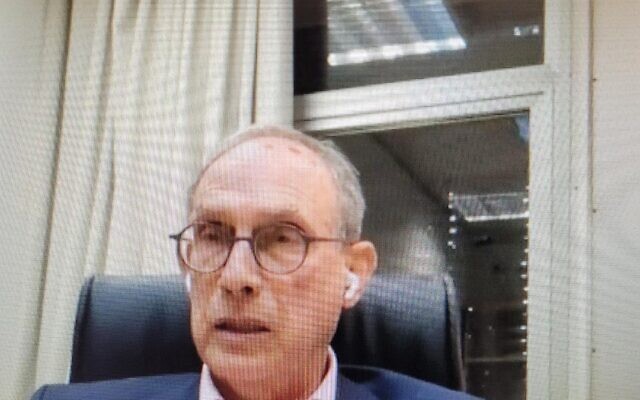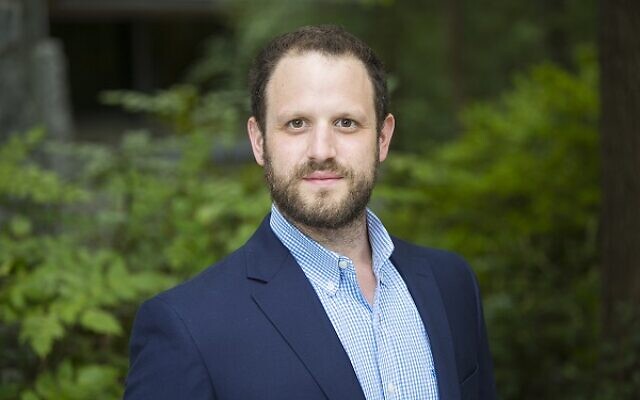Israel’s New Government May Reject Most American Jews
Outgoing Israeli Minister of Diaspora Affairs is “scared” of incoming government.

In a surprisingly candid conversation, the outgoing Israeli Minister of Diaspora Affairs Nachman Shai expressed fear for the relationship between his country and the American Jewish community in the wake of Israel’s recent election.
Speaking from Israel in a webinar sponsored by the Department of International Affairs at the University of Georgia (UGA), Shai told a group of students and a few dozen virtual participants that some of the statements by Knesset members who are expected to join the governing coalition government “scare” him.
“I’m awfully concerned about Israel and its relationship with the American Jewish community,” Shai said in response to a question from Eli Sperling, the Israel Institute Teaching Fellow at UGA. Shai and Sperling once taught alongside each other at Emory University. Shai said that Israel is “recovering from this election” that was held Nov. 1 that, he said, would “affect Israel/world, Israel/U.S. and Israel/Jewish Diaspora relations.”
Of the two parties considered on the left of the political spectrum, only one is left, Shai’s Labor Party, and it will have only four members sitting in the Knesset. Shai won’t be a member of the next Knesset. This once governing party, the movement of David Ben Gurion, Shimon Peres, and Yitzhak Rabin, held as many as 50 of the 120 Knesset seats at one point.
“My personal challenge is to try and help form a new political movement based on the remnants of the left-leaning parties,” Shai said during the discussion entitled, “What is going on in Israeli politics?” He said it is necessary to “fill the void,” resulting in one-third of the Israeli population no longer being represented in the Knesset. His dream, which he called realistic, is for the 300,000 Israelis who voted for the leftwing parties to create a new party that, along with other smaller parties, would then represent as many as 400,000 Israelis, equally approximately 10 to 12 Knesset seats.

The former brigadier general of the Israel Defense Forces cited two particular concerns about the anticipated makeup of the next coalition government. The Religious Zionism slate garnered 14 seats in the recent election and is expected to partner with former Prime Minister Benjamin Netanyahu’s Likud Party with 32 seats and two ultra-Orthodox parties, Shas and United Torah Judaism, which held a combined 18 seats. Israeli President Isaac Herzog tasked Netanyahu with establishing the next government on Nov. 13. He has 28 days to succeed at that endeavor.
Two members of Religious Zionism, Itamar Ben-Gvir and Bezalel Smotrich, are especially concerning, indicated Shai. The former hopes to become the next Public Security Minister, responsible for the police who more than once investigated him, and eventually convicted him of incitement. Smotrich, who wants to become the next Defense Minister, had also been arrested of a charge of terrorism.
Ben-Gvir split his Otzma Yehudit, Jewish Power, Party from the Religious Zionism bloc on Nov. 18.
According to Shai, the U.S. government has indicated that it won’t cooperate with the two potential ministers. “They don’t trust them very much,” he said.
The other issue that Shai said may come between Israel and American Jews is the fact that “the majority of the next coalition will be ultra-Orthodox or Orthodox” which don’t respect the Reform and Conservative Jewish denominations, comprising the majority of American Jews. He referred to the fact that in a previous Netanyahu government, an agreement was reached to allow egalitarian prayers at the Kotel, or Western Wall, then was reversed by the Orthodox parties in the coalition.
American Jews, Shai said “felt betrayed by the government of Israel.” While the Kotel is “just a symbol” to most Israeli Jews, it is the “center of Jewish life for many of you,” he said, speaking to the American Jewish community. “Already there’s a divide between you and us. We are getting farther apart from each other.” He called it a potential “tragedy.”
Shai did not mention that future coalition partners have stated that they want to override the Supreme Court’s ruling that recognized Reform and Conservative conversions to Judaism and possibly cancel the “grandchild clause” that allows a grandchild of a Jew to immigrate to Israel.
In answer to questions from his audience, the former Israeli Institute Visiting Professor at Emory also spoke about the potential “end of the Zionist dream.” He believes that Israel must separate from the Palestinians in Gaza and the West Bank for the country to remain a Jewish and democratic state. “We should find the framework in which they will live their lives and we live ours” with security, he said.
Between the Jordan River and the Mediterranean Sea, there are already an equal number of Jews and Arabs. If the two peoples aren’t separated, Shai said, Israel would no longer be a Zionist, Jewish or democratic state. In response to a student’s question, he added, “I don’t see any chance” of Netanyahu doing anything to change that possible outcome.
In the waning days of the current Israeli government, reflecting Shai’s concern about Israel’s relationship with the American Jewish community, his ministry signed a $2.3 million partnership with the Reform Movement to focus on pro-Israel advocacy among high school students in the U.S. “We feel there’s a lack of knowledge” among the younger generation, he said.
Answering a question from the AJT about the project, Shai said the Conservative Movement will soon join that agreement. He doesn’t expect the change of governing coalitions to impact this ambitious initiative.
“The money is there, and I hope it will be implemented. In principle, it is irreversible.”
- Israel news
- politics
- Jan Jaben-Eilon
- Israeli Minister of Diaspora Affairs Nachman Shai
- American-Jewish community
- Department of International Affairs at the University of Georgia (UGA)
- Eli Sperling
- Emory University
- Labor Party
- Knesset
- David Ben-Gurion
- Shimon Peres
- Yitzhak Rabin
- Israel Defense Forces
- Religious Zionism
- Likud Party
- Prime Minister Benjamin Netanyahu
- Shas
- United Torah Judaism
- Itamar Ben-Gvir
- Bezalel Smotric
- Otzma Yehudit
- Jewish Power



comments